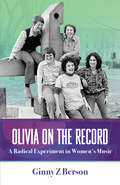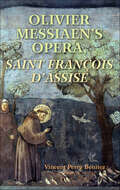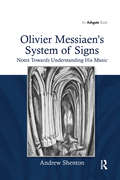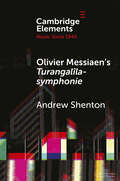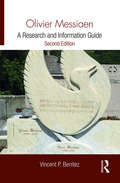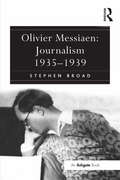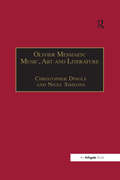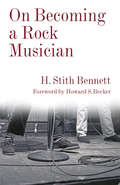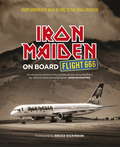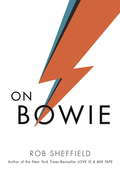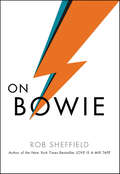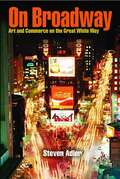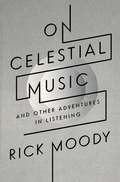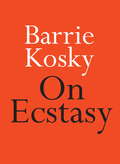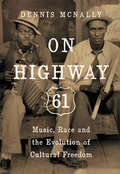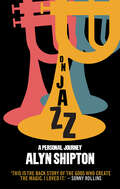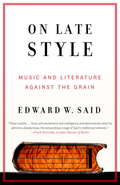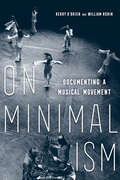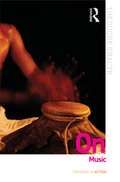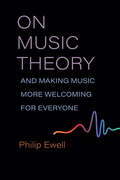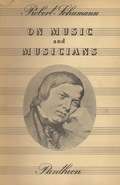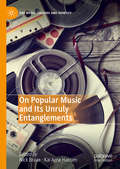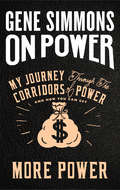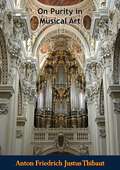- Table View
- List View
Olivia on the Record: A Radical Experiment in Women's Music
by Ginny Z BersonThe burgeoning lesbian and feminist movements of the '70s and '80s created an impetus to form more independent and equitable social and cultural institutions—bookstores, publishers, health clinics, and more—to support the unprecedented surge in women's arts of all kinds. Olivia Records was at the forefront of these models, not only recording and distributing women's music but also creating important new social spaces for previously isolated women and lesbians through concerts and festivals. Ginny Z. Berson, one of Olivia's founding members and visionaries, kept copious records during those heady days—days also fraught with contradictions, conflicts, and economic pitfalls. With great honesty, Berson offers her personal take on what those times were like, revisiting the excitement and the hardships of creating a fair and equitable lesbian-feminist business model—one that had no precedent.
Olivier Messiaen's Opera, Saint François d'Assise
by Vincent Perez BenitezIn this comprehensive study of Olivier Messiaen's magnum opus, Saint François d'Assise, Vincent Perez Benitez examines the opera from both theological and musical-analytical perspectives to ask how Messiaen expresses his Catholic theology through his work. Benitez combines a close reading of the opera score with accounts from Messiaen's associates, studies of Messiaen's birdsong notebooks and other primary documents, and an examination of the religious, musical, poetic, and visual arts literature with which the composer was familiar to explore how the opera's harmonic language and sound-color relationships motivate its musical meaning and expression. Through his analysis of these diverse sources and comparisons of Saint François d'Assise with other works such as Berg's Wozzeck and Wagner's Parsifal, Benitez places Messiaen's compositional practice within larger musical perspectives and historical contexts.
Olivier Messiaen's System of Signs: Notes Towards Understanding His Music
by Andrew ShentonAndrew Shenton's groundbreaking cross-disciplinary approach to Messiaen's music presents a systematic and detailed examination of the compositional techniques of one of the most significant musicians of the twentieth century as they relate to his desire to express profound truths about Catholicism. It is widely accepted that music can have mystical and transformative powers, but because 'pure' music has no programme, Messiaen sought to refine his compositions to speak more clearly about the truths of the Catholic faith by developing a sophisticated semiotic system in which aspects of music become direct signs for words and concepts. Using interdisciplinary methodologies drawing on linguistics, cognition studies, theological studies and semiotics, Shenton traces the development of Messiaen's sign system using examples from many of Messiaen's works and concentrating in particular on the M tations sur le myst de la Sainte Trinit or organ, a suite which contains the most sophisticated and developed use of a sign system and represents a profound exegesis of Messiaen's understanding of the Catholic triune God. By working on issues of interpretation, Shenton endeavours to bridge the traditional gap between scholars and performers and to help people listen to Messiaen's music with spirit and understanding.
Olivier Messiaen's Turangalîla-symphonie (Elements in Music since 1945)
by Andrew ShentonAs one of only a few pieces not primarily inspired by Messiaen's Catholic faith, but by human love as described in the romance of Tristan and Isolde and elsewhere, the Turangalîla-symphonie is contextualized in Messiaen's oeuvre and as a genre piece. Using previously untranslated information from Messiaen's own description of the work in his Traité, close analysis of the music seeks to demystify some of the complex innovations he made to his musical language, especially in the areas of rhythm and orchestration. This Element pays special attention to the fragmentary and elusive program which is explained with reference to Messiaen's fascination with surrealism at this time. Information is included on the commission and composition of the piece, its premiere by the Boston Symphony Orchestra conducted by Leonard Bernstein, its revision by Messiaen in 1990, and its reception history in both live and recorded performances.
Olivier Messiaen: A Research and Information Guide (Routledge Music Bibliographies)
by Vincent BenitezOlivier Messiaen: A Research and Information Guide, Second Edition presents researchers with the most significant and helpful resources on Olivier Messiaen, one of the twentieth century's greatest composers. With multiple indices, this annotated bibliography will serve as an excellent tool for librarians, researchers, and scholars sorting through the massive amount of material in the field. The second edition has been fully revised and updated.
Olivier Messiaen: Journalism, 1935-1939
by Stephen BroadOne of the foremost composers of the twentieth century, Olivier Messiaen wrote widely on his music and on his beliefs. This is the first edition of his early journalism and provides both the original French text and an English translation. The writing in this volume dates from the 1930s, before the composer gained the international reputation that he and his music now enjoy. The pieces he wrote range from reviews of individual performances to essays on particular works or composers and articles that discuss more general themes such as sincerity of expression in music. Many of the articles included in this collection are new to the Messiaen bibliography, and others are available here for the first time in English. A number are, as Broad describes them, 'quietly shocking' in that they force us to reappraise certain aspects of the composer such as his role in La Jeune France, and his wider participation in the debates of his time. This edition, therefore, represents a new source for understanding Messiaen and provides a fascinating glimpse of the composer in the early part of his career.
Olivier Messiaen: Music, Art and Literature (Music And Literature Ser.)
by Nigel SimeoneWhen Olivier Messiaen died in 1992, the prevailing image was of a man apart; a deeply religious man whose only sources of inspiration were God and Nature and a composer whose music progressed along an entirely individual path, artistically impervious to contemporaneous events and the whims both of his contemporaries and the critics. Whilst such a view contains a large element of truth, the past ten years has seen an explosion of interest in the composer, and the work of a diverse range of scholars has painted a much richer, more complex picture of Messiaen. This volume presents some of the fruits of this research for the first time, concentrating on three broad, interrelated areas: Messiaen's relationship with fellow artists; key developments in the composer's musical language and technique; and his influences, both sacred and secular. The volume assesses Messiaen's position as a creative artist of the twentieth century in the light of the latest research. In the process, it identifies some of the key myths, confusions and exaggerations surrounding the composer which often mask equally remarkable truths. In attempting to reveal some of those truths, the essays elucidate a little of the mystery surrounding Messiaen as a man, an artist, a believer and a musician. Specifically, the volume covers Messiaen's attitudes and associations to Cocteau, Stravinsky's Les Noces, Dutilleux and Toesca, as well as exploring his teaching techniques, the Trait�e rythme, de couleur et d'ornithologie, Messiaen's harmony, performing and transcription techniques, composing for Ondes Martenot, his association with ballet, Saint Fran‘s d'Assise and the influence of his faith. Messiaen himself contributes directly in the form of a speech that he gave about the tapestry-maker Jean Lur and the collection also includes the first literary translation of L' en bourgeon; the garland of poems written by Messiaen's mother, C�le Sauvage, when she was expecting him. The composer de
On Becoming a Rock Musician (Legacy Editions)
by H. Stith BennettIn the 1960s and 1970s, becoming a rock musician was fundamentally different than playing other kinds of music. It was a learned rather than a taught skill. In On Becoming a Rock Musician, sociologist H. Stith Bennett observes what makes someone a rock musician and what persuades others to take him seriously in this role. The book explores how bands form; the backstage and onstage reality of playing in a band; how bands promote themselves and interact with audiences and music professionals like DJs; and the role of performance.
On Board Flight 666
by Iron Maiden John McMurtrieThe first and only official book from Britain's biggest heavy-metal band.IRON MAIDEN are a global phenomenon. On board their customised Boeing 757 plane named Ed Force One, and piloted by lead singer and airline captain Bruce Dickinson, the band, crew and 12 tonnes of equipment traversed the planet and broke the mould of traditional touring forever by playing concerts in every continent except Antarctica! Setting off in early 2008 on the Somewhere Back In Time world tour, through to the epic Final Frontier tour, Maiden finally played two sold-out shows in their native London. The Final Frontier tour celebrated their 15th and most successful studio album to date, hitting the No.1 spot in at least 28 countries. The band's official photographer John McMurtrie accompanied them on the tours and his unrestricted access allowed him to capture exclusive images and moments both onstage and off, in over 600 spectacular photographs annotated with individual insights and anecdotes.ON BOARD FLIGHT 666 provides an unprecedented insight into one of the most adventurous rock tours ever undertaken; and into what makes this band so special.
On Bowie
by Rob SheffieldOn Bowie is a thoughtful and loving meditation on the life of the late David Bowie that explores his creative legacy and the enduring and mutual connection he enjoyed with his fansInnovative. Pioneering. Brave. Until his death in January 2016, David Bowie created art that not only pushed boundaries, but helped fans understand themselves and view the world from fantastic new perspectives.When the shocking news of his death on January 10, 2016 broke, the outpouring of grief and adulation was immediate and ongoing. Fans around the world and across generations paid homage to this brilliant, innovate, ever-evolving artist who both shaped and embodied our times.In this concise and penetrating book, highly-regarded Rolling Stone critic, bestselling author, and lifelong Bowie fan Rob Sheffield shares his own feelings about the passing of this icon and explains why Bowie's death has elicited such an unprecedented emotional outpouring from so many.
On Bowie
by Rob SheffieldFrom the New York Times bestselling author of Love Is a Mix Tape, a thoughtful and loving meditation on the life of the late David Bowie that explores his creative legacy and the enduring and mutual connection he enjoyed with his fans.Innovative. Pioneering. Brave. Until his death in January 2016, David Bowie created art that not only pushed boundaries, but helped fans understand themselves and view the world from fantastic new perspectives.When the shocking news of his death on January 10, 2016 broke, the outpouring of grief and adulation was immediate and ongoing. Fans around the world and across generations paid homage to this brilliant, innovate, ever evolving artist who both shaped and embodied our times.In this concise and penetrating book, featuring color photographs, highly regarded Rolling Stone critic, bestselling author, and lifelong Bowie fan Rob Sheffield shares his own feelings about the passing of this icon and explains why Bowie’s death has elicited such an unprecedented emotional outpouring from so many lives.
On Broadway: Art and Commerce on the Great White Way
by Steven AdlerAt a critical, transitional moment in the history of Broadway—and, by extension, of American theatre itself—former Broadway stage manager Steven Adlerenlists insider perspectives from sixty-six practitioners and artists to chronicle the recent past and glimpse the near future of the Great White Way. From marquee names to behind-the-scenes power brokers, Adler has assembled a distinctly knowledgeable cast of theatre’s elite, including Stephen Sondheim, Arthur Laurents, Des McAnuff, Frank Rich, Robin Wagner, Rocco Landesman, Robert Longbottom, Todd Haimes, Bernard Gersten, and Alan Eisenberg. <P><P> On Broadway: Art and Commerce on the Great White Way spotlights the differing vantage points of performers, artists, writers, managers, producers, critics, lawyers, theatre owners, union leaders, city planners, and other influential players. Each details his or her firsthand account of the creative and economic forces that have wrought extraordinary changes in the way Broadway theatre is conceived, produced, marketed, and executed. Once the paramount site of American theatre, Broadway today is becoming a tourist-driven, family-friendly, middle-class entertainment oasis in Midtown, an enterprise inextricably bound to the larger mosaic of national and international professional theatre. <P><P> Accounting for this transformation and presaging Broadway’s identity for the twenty-first century, Adler and his interviewees assess the impact of the advent of corporate producers, the ascendance of not-for-profit theatres on Broadway, and the growing interdependence between regional and Broadway productions. Also critiqued are the important roles of the radical urban redevelopment staged in Times Square and the changing demographics and appetites of contemporary theatre audiences in New York and around the globe. <P><P> Actors and administrators, performers and producers, theatre students and theatregoers will all benefit from the perceptive insights in this authoritative account of theatre making for the new millennium.
On Celestial Music: And Other Adventures in Listening
by Rick MoodyRick Moody has been writing about music as long as he has been writing, and this book provides an ample selection from that output. His anatomy of the word cool reminds us that, in the postwar 40s, it was infused with the feeling of jazz music but is now merely a synonym for neat. "On Celestial Music," which was included in Best American Essays, 2008, begins with a lament for the loss in recent music of the vulnerability expressed by Otis Redding's masterpiece, "Try a Little Tenderness;" moves on to Moody's infatuation with the ecstatic music of the Velvet Underground; and ends with an appreciation of Arvo Part and Purcell, close as they are to nature, "the music of the spheres."Contemporary groups covered include Magnetic Fields (their love songs), Wilco (the band's and Jeff Tweedy's evolution), Danielson Famile (an evangelical rock band), The Pogues (Shane McGowan's problems with addiction), The Lounge Lizards (John Lurie's brilliance), and Meredith Monk, who once recorded a song inspired by Rick Moody's story "Boys." Always both incisive and personable, these pieces inspire us to dive as deeply into the music that enhances our lives as Moody has done--and introduces us to wonderful sounds we may not know.
On Ecstasy
by Barrie Kosky'My polish grandmother made a chicken soup like no other chicken soup. To this day, it has, to my knowledge and experience, never been bettered ... Her chicken soup was the Caravaggio of soups. The Rainer Marie Rilke of soups. The Arturo Benedetti Michelangeli of soups.'A compelling and entertaining stoyteller, Barrie Kosky explores the feelings of intense joy and delight, as well as the power and terror that is ecstasy.
On Highway 61: Music, Race and the Evolution of Cultural Freedom
by Dennis McnallyOn Highway 61 explores the historical context of the significant social dissent that was central to the cultural genesis of the sixties. The book is going to search for the deeper roots of American cultural and musical evolution for the past 150 years by studying what the Western European culture learned from African American culture in a historical progression that reaches from the minstrel era to Bob Dylan. The book begins with America's first great social critic, Henry David Thoreau, and his fundamental source of social philosophy:---his profound commitment to freedom, to abolitionism and to African-American culture. Continuing with Mark Twain, through whom we can observe the rise of minstrelsy, which he embraced, and his subversive satirical masterpiece Huckleberry Finn. While familiar, the book places them into a newly articulated historical reference that shines new light and reveals a progression that is much greater than the sum of its individual parts. As the first post-Civil War generation of black Americans came of age, they introduced into the national culture a trio of musical forms-ragtime, blues, and jazz- that would, with their derivations, dominate popular music to this day. Ragtime introduced syncopation and become the cutting edge of the modern 20th century with popular dances. The blues would combine with syncopation and improvisation and create jazz. Maturing at the hands of Louis Armstrong, it would soon attract a cluster of young white musicians who came to be known as the Austin High Gang, who fell in love with black music and were inspired to play it themselves. In the process, they developed a liberating respect for the diversity of their city and country, which they did not see as exotic, but rather as art. It was not long before these young white rebels were the masters of American pop music - big band Swing.As Bop succeeded Swing, and Rhythm and Blues followed, each had white followers like the Beat writers and the first young rock and rollers. Even popular white genres like the country music of Jimmy Rodgers and the Carter Family reflected significant black influence. In fact, the theoretical separation of American music by race is not accurate. This biracial fusion achieved an apotheosis in the early work of Bob Dylan, born and raised at the northern end of the same Mississippi River and Highway 61 that had been the birthplace of much of the black music he would study. As the book reveals, the connection that began with Thoreau and continued for over 100 years was a cultural evolution where, at first individuals, and then larger portions of society, absorbed the culture of those at the absolute bottom of the power structure, the slaves and their descendants, and realized that they themselves were not free.
On Jazz: A Personal Journey
by Alyn ShiptonFew musical genres inspire the passionate devotion of jazz. Its mystique goes far beyond the melodies and rhythms, with its key players and singers discussed by aficionados with a respect that borders on reverence. Some books on jazz offer little more than theory or dry facts, thereby relinquishing the 'essence' of the music. This book is different. One of the most influential and internationally known writers on the subject describes, through vivid personal contacts, reminiscences and zesty anecdotes, his life in jazz as a player, broadcaster and observer. Alyn Shipton recalls friendships with legendary musicians, while revealing fresh discoveries about such luminaries as Fats Waller, Louis Armstrong, Count Basie, Duke Ellington, Charlie Parker, Abbey Lincoln and Geri Allen. On Jazz powerfully evokes the atmosphere of clubs and dancehalls, and takes us behind the scenes and up onto the stage, so that this electrifying world is unforgettably spotlighted as never before.
On Late Style: Music and Literature Against the Grain
by Edward W. SaidIn this fascinating book, Edward Said looks at the creative contradictions that often mark the late works of literary and musical artists. Said shows how the approaching death of an artist can make its way into his work, examining essays, poems, novels, films, and operas by such artists as Beethoven, Genet, Mozart, Lampedusa, Euripides, Cavafy, and Mann, among others. He uncovers the conflicts and complexity that often distinguish artistic lateness, resulting in works that stood in direct contrast to what was popular at the time and were forerunners of what was to come in each artist's discipline-works of true genius. Eloquent and impassioned, brilliantly reasoned and revelatory, On Late Style is Edward Said's own great last work.From the Trade Paperback edition.ion." He also writes about Theodor Adorno and about Glenn Gould, who chose to stop performing, thereby creating his own form of lateness. Said makes clear that most of the works discussed are rife with deep conflict and an almost impenetrable complexity. In fact, he feels that lateness is often "a form of exile." These works frequently stood in direct contrast to what was popular at the time, but they were forerunners of what was to come in each artist's particular discipline--works of true genius.Eloquent and impassioned, brilliantly reasoned and revelatory, On Late Style is Edward Said's own great last work.From the Hardcover edition.
On Minimalism: Documenting a Musical Movement
by Kerry O’Brien and William RobinA revisionist history of minimalism's transformative rise, through the voices of the musicians who created it. When composers like Philip Glass and Steve Reich began creating hypnotically repetitive music in the 1960s, it upended the world of American composition. But minimalism was more than a classical phenomenon—minimalism changed everything. Its static harmonies and groovy pulses swept through the broader avant-garde landscape, informing the work of Yoko Ono and Brian Eno, John and Alice Coltrane, Pauline Oliveros and Julius Eastman, and many others. On Minimalism moves from the style's beginnings in psychedelic counterculture through its present-day influences on ambient jazz, doom metal, and electronic music. The editors look beyond the major figures to highlight crucial and diverse voices—especially women, people of color, and LGBTQ+ musicians—that have shaped the genre. Featuring more than a hundred rare historical sources, On Minimalism curates this history anew, documenting one of the most important musical movements of our time.
On Music (Thinking in Action)
by Theodore GracykOpinionated and example-filled, this extremely concise and accessible book provides a survey of some fundamental and longstanding debates about the nature of music. The central arguments and ideas of historical and contemporary philosophers are presented with the goal of making them as accessible as possible to general readers who have no background in philosophy. The emphasis is on instrumental music, but examples are drawn from many cultures as well as from Western classical, jazz, folk, and popular music.
On Music Theory, and Making Music More Welcoming for Everyone (Music and Social Justice)
by Philip EwellSince its inception in the mid-twentieth century, American music theory has been framed and taught almost exclusively by white men. As a result, whiteness and maleness are woven into the fabric of the field, and BIPOC music theorists face enormous hurdles due to their racial identities. In On Music Theory, Philip Ewell brings together autobiography, music theory and history, and theory and history of race in the United States to offer a black perspective on the state of music theory and to confront the field’s white supremacist roots. Over the course of the book, Ewell undertakes a textbook analysis to unpack the mythologies of whiteness and western-ness with respect to music theory, and gives, for the first time, his perspective on the controversy surrounding the publication of volume 12 of the Journal of Schenkerian Studies. He speaks directly about the antiblackness of music theory and the antisemitism of classical music writ large and concludes by offering suggestions about how we move forward. Taking an explicitly antiracist approach to music theory, with this book Ewell begins to create a space in which those who have been marginalized in music theory can thrive.
On Music and Musicians
by Robert SchumannEdited by Konraad WolffTranslated by Paul RosenfeldWith twenty black-and-white illustrationsSchumann&’s literary gifts and interests almost equaled his musical ones. From boyhood on he was drawn to literary expression, and his writings on music belong to the best among the romantic literature of the 19th century. The same fire, poetry, directness of expression, the same inventiveness we love in his compositions, also animated his prose.This edition for the first time groups his articles and observations according to subject matter and individual composers. It is complete as far as Schumann&’s writings on the great composers are concerned. All his reviews of the works by the masters, from Beethoven to Brahms, are included, some of them translated for the first time into English.
On Popular Music and Its Unruly Entanglements: Blurring The Lines (Pop Music, Culture and Identity)
by Nick Braae Kai Arne HansenOn Popular Music and Its Unruly Entanglements comprises eleven essays that explore the myriad ways in which popular music is entwined within social, cultural, musical, historical, and media networks. The authors discuss genres as diverse as mainstream pop, hip hop, classic rock, instrumental synthwave, video game music, amateur ukelele groups, and audiovisual remixes, while also considering the music’s relationship to technological developments, various media and material(itie)s, and personal and social identity. The collection presents a range of different methodologies and theoretical positions, which results in an eclecticism that aptly demonstrates the breadth of contemporary popular music research. The chapters are divided into three major sections that address: wider theoretical and analytical issues (“Broad Strokes”), familiar repertoire or concepts from a new perspective (“Second Takes”), and the meanings to arise from music’s connections with other media forms (“Audiovisual Entanglements”).
On Power: My Journey Through the Corridors of Power and How You Can Get More Power
by Gene SimmonsThe KISS frontman and entrepreneur shares his philosophy of power—how to attain it, keep it, and harness it as a driving force in business and life.As co-founder of KISS, America’s #1 gold record-winning group of all time, Gene Simmons knows the thrill and seduction of power firsthand. But gold records alone don’t equal power. The decisions you make once you attain a certain level of success are what separate the pretenders from the pantheon.Inspired by Niccolo Machiavelli’s The Prince, Simmons offers his unique take on the dynamics of power in every realm of life, from the bedroom to the boardroom, as well as the worlds of celebrity, social media, and politics. With one-of-a-kind anecdotes from his life and career, as well as stories from historical and contemporary masters of power, including Winston Churchill, Napoleon Bonaparte, Warren Buffett, Michael Jordon, Oprah, and Elon Musk, Simmons crafts a persuasive and provocative theory on how the pursuit of power drives civilization and defines our lives.The rules of power are changing in today’s fast-paced, hyper-connected world in a way that Machiavelli never could have imagined, and we all need to learn to adapt. Simmons tells readers: Ignore the negatives. Be unrelenting. Rise above the rest. You are the architect of your success.
On Purity in Musical Art
by Anton Friedrich Justus ThibautFirst published at Heidelberg in 1825 this is a study of moral purity in music, particularly church music.“The fact that this Essay was first published more than half a century ago, might seem, at first sight, to render its translation now a work of doubtful utility. But, inasmuch as it is still in demand in Germany, as is proved by the publication of the Fifth Edition as recently as in 1875, and looking to the great extension of the study and practice of music in our own country, I am persuaded that it will be read both with interest and with profit in England.”-Preface
